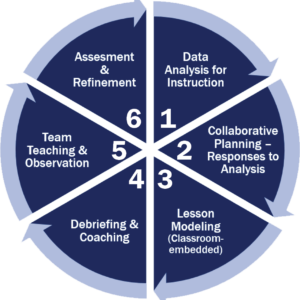
Transform classrooms for emergent bilingual learner success
Build on teachers’ natural strengths and training
Facilitate collaborative planning based on data
Minimize out-of-class time for professional development
Raise student confidence, competency and achievement
Energize student learning and increase academic achievement of emergent bilingual learners. Through dynamic coaching and modeling, IDRA can help you create a hands-on problem-solving environment that engages students of all backgrounds and helps every student succeed. Grounded in best practices research, IDRA’s professional development model focuses on increasing emergent bilingual proficiency and achievement while deepening teacher knowledge. IDRA literacy coaching is customized to integrate district and campus initiatives.
IDRA’s literacy coaching services are structured in six phases designed to build teacher and staff capacity embedded into their daily routines. This minimizes time outside of class in day-long professional development sessions.

Energize – Learning –
Increase – Achievement
Phases in IDRA Coaching
1. Data Analysis for Emergent Bilingual Literacy Instruction
We begin by analyzing standardized test results and district language assessments to provide a context and identify challenges. This is followed by analysis of classroom cohort performance. IDRA’s emergent bilingual literacy coach will then assist in goal setting.
2. Collaborative Planning – Response to Analysis
Collaborative planning is at the heart of IDRA’s classroom-embedded professional development model. During planning or PLC periods, IDRA will facilitate staff in planning instructional responses to data results by objectives and standards. Instructional responses are pedagogically sound, research-based interventions, models, processes and assessments for emergent bilingual students.
3. Lesson Modeling (Classroom Embedded)
Through lesson modeling, teachers will see implementation of practices planned collaboratively. IDRA will model the lessons in your classrooms while teachers (single, pairs, grade level cluster) experience the lesson as observers.
4. Debriefing & Coaching
Debriefing follows each lesson modeling session and are a vital part of the cycle. IDRA uses a cognitive coaching model to provide a judgment-free zone so that instructors are able to express any challenges they may face when implementing practices themselves.
5. Team Teaching and Observation
IDRA will assist teachers as they implement their chosen practices. These opportunities will present themselves organically throughout the cycle.
6. Assessment & Refinement
Using cognitive coaching strategies, these sessions will provide feedback and data to improve classroom practices. Assessments refer to reviewing results from student tests that assess the objectives identified by the team.
Instructional Strategies
Instructional responses explored in collaborative planning comprise pedagogically sound, research-based interventions, models, processes and assessments for emergent bilingual students, including:
- Balanced literacy
- Establishing reading processes (APK, predicting, setting purpose, summarizing/main idea, monitoring comprehension, reviewing)
- Whole group, small group and Individual reading classroom processes
- Differentiated instruction
- Inferencing as a habit
- Close reading strategies
- Technology integration practices
Start your literacy coaching today!
With an unwavering commitment to student success, IDRA services provide innovative, practical and sustainable solutions for diverse student populations based on the unique needs of each district, campus or classroom.
Request a quote today!
contact@idra.org or 210-444-1710

